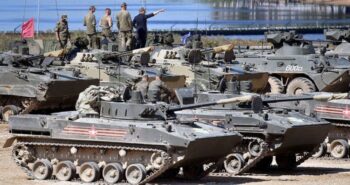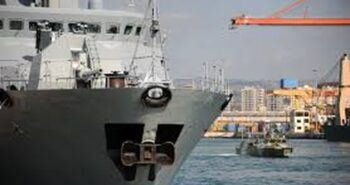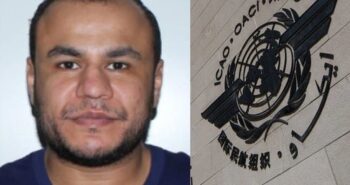By Geoff Porter
Imagine a multi-pronged, low intensity conflict. It’s been dragging on for five or so years. Sometimes this faction gains ground. Sometimes that. Or maybe it’s a third or fourth group. And then imagine a truce between two of the conflict’s numerous groups.
Progress, you think. A first step toward ultimately reconciling all the other groups. Peace will surely break out.
But it turns out that the truce’s two groups aren’t actually fighting one another. And one party to the ceasefire isn’t really a group at all – it’s more of an idea with a figurehead. In fact, it doesn’t even really have arms to cease firing. The truce’s other party only acquiesced to the agreement because its terms were vague enough not to impede it from doing anything it wants. What a farce, you think.
But it’s worse than that because the truce signed by Fayez Sarraj, the head of Libya’s UN-brokered Government of National Accord (GNA), and Field Marshall Khalifa Haftar, the head of the so-called Libyan National Army (LNA), in the presence of French President Emmanuel Macron on July 25, 2017 ultimately ends up empowering a general with dictatorial ambitions.
One party to the ceasefire, Sarraj and the GNA, have no power in Libya. Sarraj can barely travel within Tripoli let alone throughout the country. The GNA has no real military capabilities and is obliged to rely on local militias that, at least for now, support its agenda but over which the GNA has no authority.
Sarraj’s counterparty, the LNA, which does have ample military power, ensured that the ceasefire left the door open for continued counterterrorism operations. The LNA’s commander, Khalifa Haftar, however, brands anyone that opposes him as a terrorist regardless of whether they are or they aren’t.
The ceasefire’s counterterrorism exception renders it meaningless for Haftar. It’s as if he said he would agree to stop eating bacon, with the exception of any pork products. It doesn’t make any sense.
But surely both men knew that the treaty was a hollow gesture with no practical implications in Libya itself. So why did they go to Paris? Why did they agree to it?
Sarraj didn’t really have a choice. President Macron had arranged for the meeting to be chaired by Ghassan Salamé, the new head of the UN Support Mission in Libya (UNSMIL). The Paris meeting would be Mr. Salamé’s debut. Seeing that Sarraj owes his own position to a government effectively negotiated into existence by the UN in December 2015 and largely supported by the UN ever since, Sarraj was obliged to attend.
Plus, if Mr. Salamé wanted something to come out of the meeting, Sarraj would have to go along with whatever that would be. It would not do for Mr. Salamé’s first initiative to end in failure. So Sarraj agreed to a ceasefire with a party with which he was not in direct conflict, which included language which did nothing to curtail his counterparty’s use of force, and was almost entirely unenforceable in Libya.
As for Haftar, he is always looking for opportunities to burnish his credentials internationally. Being feted in Paris by the French president goes a long way toward recasting him as a statesman rather than an aspiring strongman, which is effectively what he is. For Haftar, there was really no downside.
He either went to Paris and came away with an agreement that suited him, or if he failed to reach an agreement, he would still be able to demonstrate that he was negotiating on a par with Sarraj – Libya’s ostensible head of state – and France’s charismatic (but unpopular) president.
The agreement between Sarraj and Haftar also included a pledge to hold nationwide elections in early 2018. For Sarraj, this is something that he has to do because he was never popularly elected. Rather, his leadership was the outcome of a long and convoluted negotiation along the Moroccan shores of the Atlantic. In fact, the document that emerged from the Moroccan negotiations and led to Sarraj’s leadership stipulates that Libya would hold legislative elections within 24 months of the implementation of the GNA.
Sarraj skulked into Libya under cover of night stowed away on an Italian naval vessel in March 2016. This means elections by March 2018.
For Haftar, committing to elections is a no-brainer. If the elections go ahead, they are likely to be marred by all sorts of irregularities like voter fraud, ballot stuffing, boycotts by different blocs, and precarious security preventing voters from going to the polls.
Given Haftar’s consolidated control over a large swath of Libyan territory, all of these are likely to play in Haftar’s favor. And for the international community, Haftar doesn’t have to win free, and he doesn’t have to win fair. All he has to do is win, and he will acquire just enough democratic patina to make him legitimate-ish to Washington, Paris, Brussels, and Rome, not to mention Cairo, Abu Dhabi, and Riyadh.
If, on the other hand, elections don’t go ahead, then the GNA will be rendered illegitimate, alongside Libya’s two other illegitimate political institutions, the rump General National Congress (GNC), now known as the National Salvation Government (NSG), and the House of Representatives (HoR).
The GNC/NSG’s term expired in 2014. The HoR’s mandate was set to expire in 2015. If the GNA’s mandate expires in March 2018 without elections being held, this would leave Field Marshall Haftar the strongest (and most enduring) force in Libya but by no means an uncontested one.
Libyan opposition to Haftar’s ascent is well-founded. He embraces an unsettling intolerance for anyone who does not think like he does – including anyone of even the slightest Islamist bent. He has demonstrated a preference for military leadership over popularly elected officials, imposing his generals and commanders on cities under his control. And he has shown a disdain for rule of law, including harboring one of his officers who is wanted by the International Criminal Court for committing war crimes.
But President Macron, in his eagerness to try to score some foreign policy points as his popularity ratings plummet at home, may have inadvertently propelled Haftar closer to power.
***
Dr. Geoff D. Porter is the founder and president of North Africa Risk Consulting, a political and security risk consulting firm specializing in the extractive industries in North Africa. In addition, Dr. Porter is an assistant professor at the Combating Terrorism Center at the United States Military Academy at West Point.
__________________




